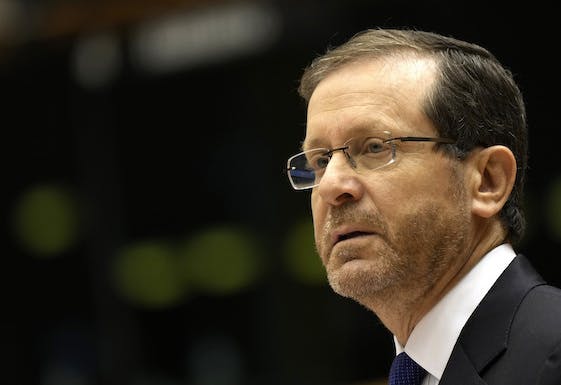Biden Is No Nero, but His Intervention in Israeli Debate Raises Old Fears
Infighting over legislation proposed by Prime Minister Netanyahu’s government to overhaul the country’s judicial structure brings to mind the old tale of Kamtza and Bar-Kamtza and uneasiness about the idea of Israelis losing sovereignty.

Ancient fears of losing nationhood due to deep divisions among Jews is as old as Judaism itself, and it underlines President Herzog’s call for compromise over legislation proposed by Prime Minister Netanyahu’s government to overhaul the Israeli judicial structure.
The existential threat of infighting ending sovereignty is often related to the story of Kamtza and Bar-Kamtza, about how bickering Jews brought on the destruction of the Second Temple in the year 70 CE. The tale is the Hebrew equivalent of Benjamin Franklin’s “we must hang together or surely we shall hang separately.”
In the story, a group of rabbis wrongfully invited the titular Bar-Kamtza to a feast they had prepared in honor of a similarly named man, Kamtza. The rabbis rebuffed all of Bar-Kamtza’s attempts to stay at the party, humiliating him. Bar-Kamtza then turned for help to the Roman emperor, Nero, who later proceeded to destroy the Temple and exile the Jews from their homeland.
In Israel, the Kamtza and Bar-Kamtza tale has long served as a warning about the dangers of brotherly hatred. On Sunday, after weeks of anti-government protests that have seen unprecedented threats and counterthreats, Mr. Herzog addressed the nation about the proposed judicial overhaul in a televised speech.
Prime Minister Netanyahu on Monday issued a video clip calling on the opposition to end what he called their push to “anarchy.” Due to legal indictments against him and related conflict of interest issues, however, the premier is prevented from directly addressing the judicial reform effort.
Israeli press outlets reported Monday that Mr. Netanyahu’s lawyers have asked the country’s attorney general, Gali Baharav-Miara, to allow the premier to make public statements on the issue that is tearing the country apart and, specifically, on Mr. Herzog’s compromise proposals. Ms. Baharav-Miara rejected the request.
During the televised address on Sunday, Mr. Herzog proposed a five-point plan to calm the debate. The plan included elements from both sides of the fight over judicial reform. The president called for top representatives from all parties involved in the political imbroglio to convene at his office and hash out a compromise based on his proposal.
On Monday the main players behind the proposed legislation seemed agreeable: the justice minister, Yariv Levin, and the Knesset’s law and justice committee chairman, Simcha Rothman, called on the opposition leaders, Yair Lapid and Benny Gantz, to immediately meet at the president’s residence to discuss the proposal “with no preconditions.”
Yet, in his proposal the president called for a halt to the legislative process regarding the proposed judiciary overhaul until a compromise is hashed out. Answering Messrs. Levin and Rothman’s proposal, Mr. Lapid said that if they were serious “they would have agreed to stop the legislation until the end of the talks.”
Rather than lowering the flames, Mr. Herzog’s proposal led to further recriminations and a swelling of the protest.
Up to 100,000 angry opponents of the proposed judiciary reform protested Monday outside the Knesset, where Mr. Levin convened the law committee to launch the legislative process. The meeting quickly became rowdy.
Vocal sparring, crass language, and rude behavior are a staple of the Israeli legislature. Yet, Monday marked a new low as a legislator of the opposition Yesh Atid party, Yorai Lahav Hertzanu, jumped atop a table and ran across the room at Mr. Rothman. Mr. Lahav Hertzanu said later that he merely crossed a table while those who proposed the legislation are crossing a “red line.”
The statement was tame in comparison to that of the Tel Aviv mayor, Ron Huldai, who warned in an interview against turning Israel into a dictatorship. “Dictatorships can only return to be democracies through bloodshed,” he said. Likud members filed a criminal complaint against what they called the mayor’s “incitement to murder.”
The high tones of that debate have spilled beyond the country’s borders, as Mr. Netanyahu’s opponents abroad latched on to Israeli allegations that if enacted, the proposed legislation would spell an end to the country’s democracy. Even President Biden weighed in.
Egged on by an activist New York Times columnist, Thomas Friedman, Mr. Biden said that “building consensus for fundamental changes is really important to ensure that the people buy into them so they can be sustained.”
While some Americans may question Mr. Biden’s commitment to “building consensus” at home, Israelis were divided. On the left, many saw his statement as an ally attempting to help save Israel’s democracy. For the right, the appeal to outside interference in an internal Israeli debate was akin to Bar-Kamtza’s turning to Rome following a dispute among the Jews.
While the American president is far from a Nero-like destroyer of Jewish sovereignty, his intervention may end up backfiring. “When Joe Biden is trying to help” he “mostly gets in the way,” an Israeli columnist who opposes the proposed legislation, Shmuel Rosner, tweeted. “It is more difficult for the government to compromise if it looks like a capitulation to the Americans.”

